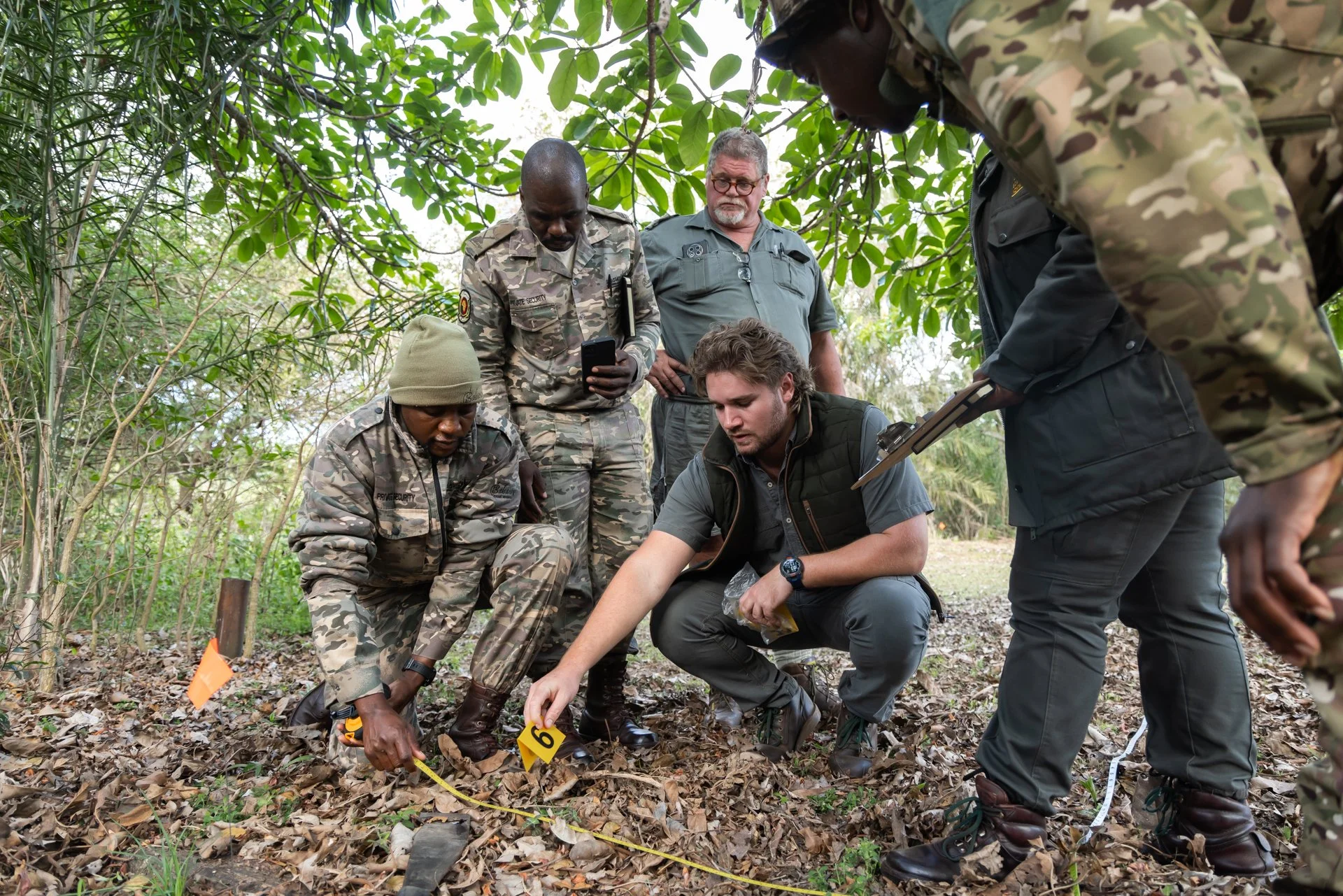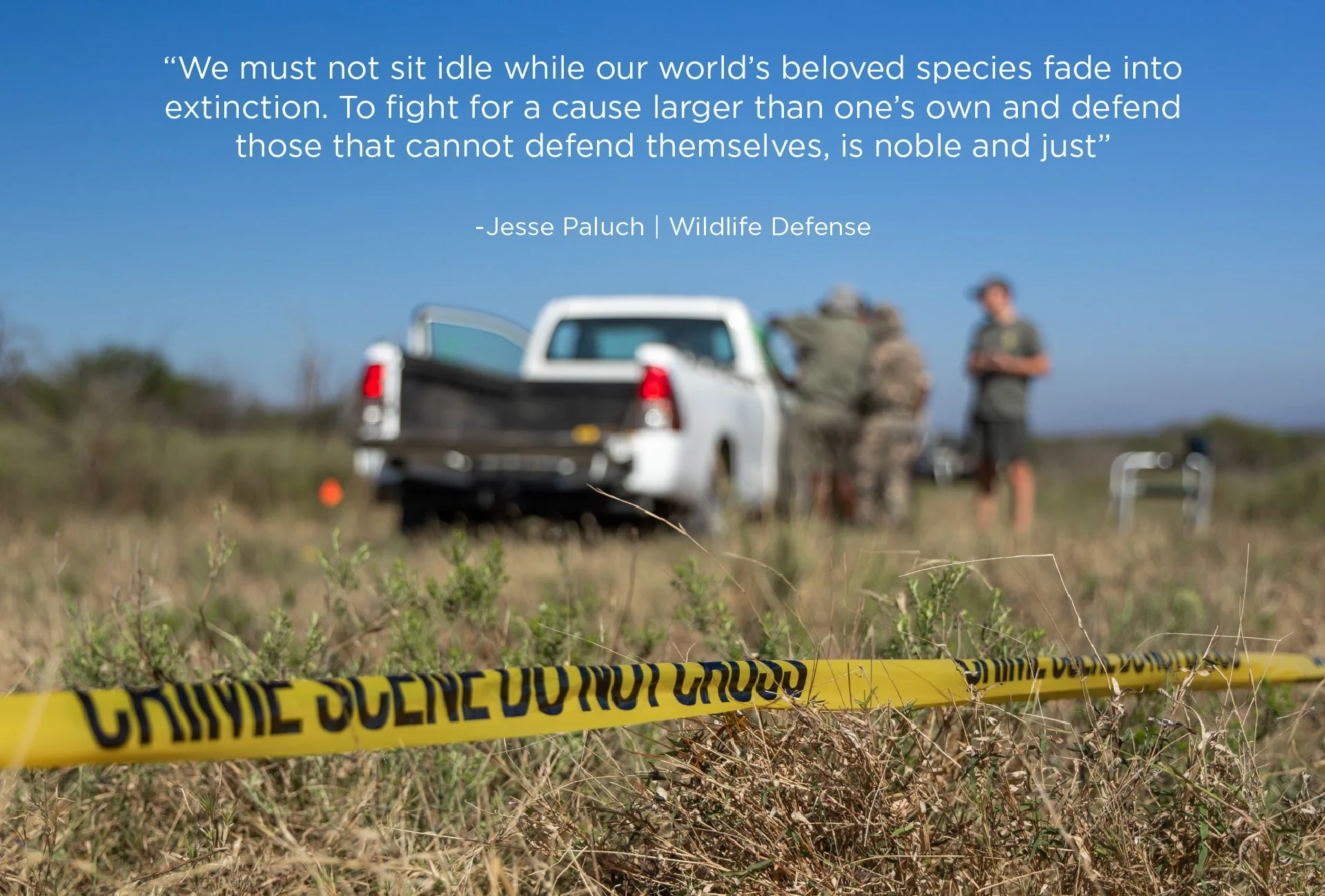WILDLIFE CRIME SCENE INVESTIGATIVE TECHNIQUES
In August 2025, Wild Tomorrow and Wild Defense came together again to host a crucial training program at Wild Tomorrows Conservation Center in KwaZulu-Natal: Wildlife Crime Scene Investigative Techniques. Now in its 3rd year, this program equips rangers and law enforcement officers with the forensic tools and investigator skills needed to respond effectively to wildlife crime scenes. Read more about this important training in our latest blog post below.
With rhinos and other endangered species under constant threat, the need for international collaboration to protect wildlife has never been greater. After the success of last year’s training, Wild Tomorrow partnered with Wildlife Defense to provide this impactful on-the-ground training again, connecting U.S. wildlife crime experts with South African rangers, police, and prosecutors.
Equipping front line rangers and law enforcement officers with crime-fighting knowledge and skills is essential in preventing illegal wildlife crime. Wild Defense’s immersive five-day Wildlife Crime Scene Investigative Techniques (WCSIT) training was made possible through the generous support of both Wildlife Defense and Wild Tomorrow’s donors, Wild Tomorrow’s World Ranger Day campaign, and World Wildlife Fund South Africa (WWF). WWF generously funded six forensic kits for reserves in attendance that are members of the Black Rhino Range Expansion Project (BRREP). Containing specialized evidence-collection equipment, these kits are now in the hands of rangers, reserve managers, security personnel, and law enforcement officers, giving them the critical skills and tools to combat the escalating poaching crisis in KwaZulu-Natal (KZN)and protect some of Africa’s most threatened species.
Over five days, participants came from across KwaZulu-Natal, representing 11 different reserves and organizations including: Babanango Game Reserve, Bonamanzi Game Reserve, False Bay Park, Hluhluwe-Imfolozi Park, Manyoni Private Game Reserve, Makongo Hills, Nyathi APU, Project Rhino, South African Police Service (SAPS), Tembe Elephant Park, as well as Thanda Private Game Reserve.
The diversity of this group underscores the collaborative nature of the course, and conservation in the province. Each participant brought unique perspectives and left not only with new skills but also with a stronger professional network.
TRAINING ON THE FRONTLINES OF WILDLIFE CRIME
South Africa is home to the largest population of rhinos in Africa and remains the target of sustained poaching fueled by demand for rhino horn in China and Vietnam where they are coveted for traditional medicine and hold symbolic status, despite being made of nothing more than keratin, the same protein as human fingernails. Each loss is a blow not only to the species but to the ecosystems they anchor.
Rangers and law enforcement face an ongoing, relentless battle. Our province remains the hardest hit although recent interventions, including dehorning have contributed to a reduction in poaching losses. Whilst dehorning alone is insufficient to protect rhino populations, this intervention combined with other efforts, has been crucial in achieving a poaching decline of nearly 30% in KwaZulu-Natal compared to the previous year, with 232 rhinos poached in the province in 2024.
Confronting this crisis demands specialized skills. Updated forensic and investigative techniques are essential to ensure every crime scene is properly secured, every piece of evidence is documented, and every case has the best chance at leading to a conviction.
INSIDE THE TRAINING
The WCSIT course, led by Wildlife defense co-Founder Jesse and Leigh Paluch alongside an expert team of instructors, combined intensive classroom learning with practical, scenario-based exercises. Over five days, participants tackled a wide array of topics, including:
Crime scene security and assessment
Evidence photography and sketching
DNA and fingerprint processing
Handling electronic evidence
Firearm identification and ballistics
Surveillance camera systems and case file management
Effective courtroom testimony
The week culminated in a mock poaching scenario where teams secured and processed a stimulated crime scene before presenting their case files and findings. This final exercise brought together everything participants had learned, reinforcing not only technical expertise but also teamwork and communication under pressure.
At the close of the WCSIT training, graduates were honored with a celebratory ceremony where they received their certificates. We are deeply grateful for the dedication and hard work of the attendees: the rangers and law enforcement officers who protect these incredible animals and the habitats they call home every day.
A TESTAMENT TO THE TRAINING
The impact of the training was clear in the words of both instructors and students.
“This year’s group stood out because of their focus, excitement, and gratitude! Their actions spoke louder than words — they showed up on time, leaned into every lesson, and approached each scenario with seriousness. It was clear that they understood how important these skills are, and they were grateful to acquire them. One of the most rewarding parts of the week was having two of last year’s students return as instructors. Watching them step up like that shows that our training isn’t a one-off...it’s the start of a cycle where rangers keep passing skills on to each other.”
PARTICIPANTS ECHOED THE VALUE OF THE COURSE:
“All field rangers should attend the training as they are the first at crime scenes.”
“This course will give me confidence to correct someone when doing the wrong thing at a scene.”
“I am dealing with crime scenes on daily basis, so I have learnt a lot from this training."
“Eye opening to see just how much detail, time and effort goes into a criminal case.”
These reflections highlight not only the technical knowledge gained but also the confidence and authority that rangers will carry back to their reserves.
TAKING ON THE FUTURE
Wildlife crime remains one of the greatest threats to South Africa’s rhino and other endangered species. By equipping rangers and law enforcement officers with advanced forensic skills, the WCSIT program strengthens the frontline response and helps ensure poachers are held accountable.
As one participant summed it up powerfully: “This training will help the future of wildlife.”
Wild Tomorrow and Wildlife Defense remain committed to expanding this work, forging partnerships, and continuing to build the capacity of those who risk their lives daily to protect South Africa’s natural heritage.











